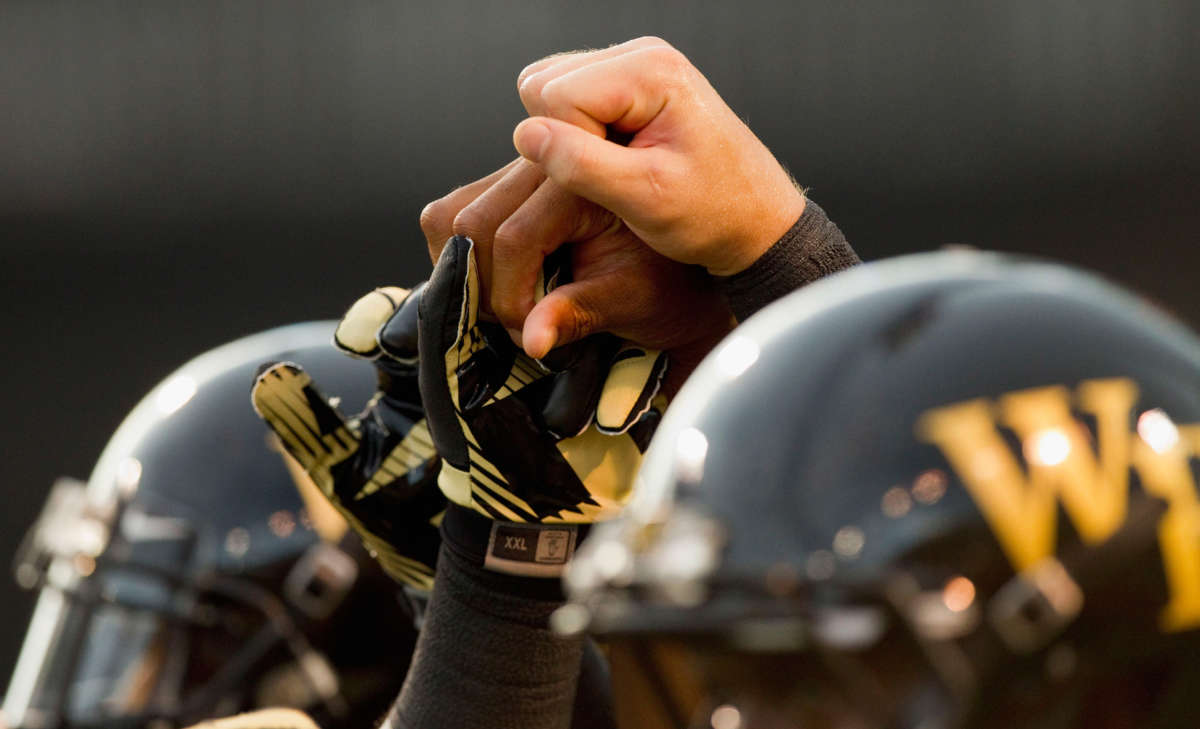Did you know that Truthout is a nonprofit and independently funded by readers like you? If you value what we do, please support our work with a donation.
Senators Bernie Sanders (I-Vermont) and Chris Murphy (D-Connecticut) introduced a bill Thursday to grant college athletes the right to collectively bargain and organize.
The College Athlete Right to Organize Act, which was also introduced in the House by Representatives Jamaal Bowman (D-New York), Andy Levin (D-Michigan) and Lori Trahan (D-Massachusetts), could help shift the balance of power between college athletes, who are unpaid, and the often wealthy coaches and administrators who virtually control their careers.
“College athletes are workers. They deserve pay, a union, and to own their own name, image, and likeness,” Sanders said in a statement. “We cannot wait for the [National Collegiate Athletic Association (NCAA)] to share its billions with the workers who create it.”
College sports make up a multibillion dollar industry — and big games can even be a boon to the local economy as well — but the athletes who power it see very little of those benefits.
The bill asserts that college athletes are employees since they generate revenue for the college in exchange for benefits like scholarships which they can lose if they quit the team. The bill proposes to amend the National Labor Relations Act so that these athletes are classified as employees, which would allow them to collectively bargain. It would prohibit agreements that waive the students’ right to collective bargaining.
The bill would also direct the National Labor Relations Board to recognize colleges within a sports conference as a bargaining unit so that athletes can work together within their conference at large.
College athletes for years have spoken out about the struggles of working unpaid in sports. In a video produced by More Perfect Union, Senator Murphy shared the story of Shabazz Napier, a former NCAA athlete at University of Connecticut.
“There’s hungry nights where I’m not able to eat, but I still gotta play up to my capabilities,” Napier once said in an interview during his time in college. “There are hungry nights where I go to bed, and I’m starving.”
Murphy points out that Napier helped make coaches and administrators “filthy rich” — but still didn’t have food to eat. “It’s really disturbing,” said Murphy.
The Connecticut lawmaker said Napier’s story is common among college athletes. A 2020 report from The Hope Center for College, Community, and Justice that found that nearly a quarter of athletes at Division I schools were food insecure at some point over the past year, and nearly 14 percent of them had experienced homelessness in the same time.
The problem is made worse by the fact that college athletes can’t work any other jobs or accept outside aid. The report includes the story of Silas Nacita, a former running back at Baylor University, who was disqualified from the NCAA after accepting housing from a friend because, as he said, his other choice was homelessness.
“The NCAA has long denied its players economic and bargaining rights while treating them like commodities,” said Murphy in a statement. “Having the right to [collectively bargain] will help athletes get the pay and protections they deserve and forces the NCAA to treat them as equals rather than second-class citizens.”
Many coaches in NCAA sports make millions of dollars in salaries while exercising huge control over their athletes. The athletes, meanwhile, have very little power or say in their conditions.
“We are at the mercy of our respective schools, they get to set the rules and treat us however they want and the worst consequence is some bad press, but the machine keeps on going,” one Pac-12 football player told The Guardian. “The power dynamics between player and coaches/schools is so off balance, guys were scared to speak up and advocate for themselves in the middle of a pandemic. The NCAA has shown they don’t give a fuck about us, it’s all about protecting the bottom line and making money.”
Murphy also points out that the issue is one of civil rights. Black athletes make up a large portion of Division I athletes, especially in the most profitable sports for the colleges.
“In sports like football and basketball, which generate the highest profits, the athletes who can’t join together and negotiate are almost overwhelmingly young Black men and women,” Murphy said, “while the executives and coaches who are allowed to collude in order to rake in those huge profits are largely white. This is a huge injustice.”
A terrifying moment. We appeal for your support.
In the last weeks, we have witnessed an authoritarian assault on communities in Minnesota and across the nation.
The need for truthful, grassroots reporting is urgent at this cataclysmic historical moment. Yet, Trump-aligned billionaires and other allies have taken over many legacy media outlets — the culmination of a decades-long campaign to place control of the narrative into the hands of the political right.
We refuse to let Trump’s blatant propaganda machine go unchecked. Untethered to corporate ownership or advertisers, Truthout remains fearless in our reporting and our determination to use journalism as a tool for justice.
But we need your help just to fund our basic expenses. Over 80 percent of Truthout’s funding comes from small individual donations from our community of readers, and over a third of our total budget is supported by recurring monthly donors.
Truthout has launched a fundraiser, and we have a goal to add 273 new monthly donors in the next 72 hours. Whether you can make a small monthly donation or a larger one-time gift, Truthout only works with your support.
